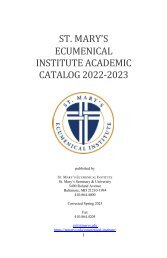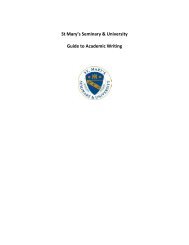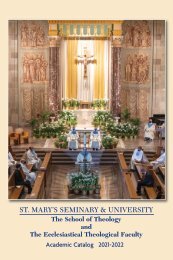EI Student Handbook 2022-2023
This Student Handbook supplements the current academic policies and procedures, which are published on our website. It also provides practical guidance for study and life within St. Mary’s Ecumenical Institute. We hope it serves as a tool of both communication and community.
This Student Handbook supplements the current academic policies and procedures, which are published on our website. It also provides practical guidance for study and life within St. Mary’s Ecumenical Institute. We hope it serves as a tool of both communication and community.
Create successful ePaper yourself
Turn your PDF publications into a flip-book with our unique Google optimized e-Paper software.
Auditors<br />
Auditors are required to attend more than 50% of<br />
a course’s class hours in order to have the course<br />
audit appear on their transcripts. Instructors may,<br />
at their discretion, require auditors to attend a<br />
greater percentage of their classes. Auditors are<br />
not permitted in certain courses, either by decision<br />
of the administration or at the discretion of the<br />
professor.<br />
Tardiness<br />
A pattern of tardiness disrupts and shortens the<br />
educational process. All students are required to<br />
arrive for class on time and to remain until the<br />
class has ended for the day. A student who is tardy<br />
or leaves early must communicate the reason to<br />
the professor in writing or electronically. A<br />
professor has the right to ask for the<br />
administrative withdrawal of any student who<br />
exhibits a pattern of tardiness or early departure<br />
and fails to alter this pattern after the professor’s<br />
encouragement to do so. (“Pattern” refers here to<br />
two or more infractions of this rule.)<br />
Alternatively, a professor may lower the student’s<br />
class participation grade and/or ask the student for<br />
supplemental work to compensate for the missed<br />
class time. The decision is solely the professor’s. A<br />
student who is administratively withdrawn is<br />
financially responsible for the course up to the date<br />
of the professor’s request for withdrawal, according<br />
to the published schedule.<br />
The tardiness policy applies to all students in E.I.<br />
classes (on-site and online), including auditors and<br />
seminarians.<br />
Cell Phones and Beepers<br />
Please see the policy on Electronic Devices, p. 31.<br />
Auditing<br />
Auditors are welcome in most courses, at the<br />
discretion of the administration and the professor,<br />
and should participate in class discussion if<br />
appropriately prepared to do so by carefully reading<br />
the assignments or other preparatory work for a<br />
class. Professors may set specific expectations and<br />
standards for participation by auditors. Auditors may<br />
also submit papers for a professor’s evaluation<br />
(normally without a grade) if they choose to do so<br />
19<br />
and if the professor agrees. As noted above, auditors<br />
are required to attend more than 50% of a course’s<br />
class hours in order to have the course audit appear<br />
on their transcripts. Instructors may, at their<br />
discretion, require auditors to attend a greater<br />
percentage of their classes.<br />
Pre- and co-requisites do not normally apply to<br />
auditors, but they may be applied at the discretion of<br />
the professor.<br />
Independent Study<br />
Independent study refers to individual study by a<br />
student, guided by an E.I. professor. It is intended to<br />
enhance a student’s program of study materially. It<br />
is not meant to permit students to take regularly<br />
scheduled courses on an individual basis, because<br />
part of the learning process is precisely the<br />
classroom experience.<br />
The topic of most independent studies falls into one<br />
of two categories: (a) a subject not offered, or not<br />
regularly offered, in the curriculum; and (b) a<br />
subject related to a course in the curriculum (which<br />
the student has, normally, already taken) but<br />
narrower/more in depth or in scope. <strong>Student</strong>s are<br />
responsible for planning their academic schedules to<br />
meet all degree requirements through regularly<br />
scheduled courses. Thus, not every course or idea<br />
qualifies for independent study.<br />
Audit students, students not in a certificate or degree<br />
program, and students with a GPA less than 3.5 are<br />
not normally eligible for independent study.<br />
Independent study is normally not permitted for any<br />
core, foundational, or regularly offered required<br />
course for an emphasis or concentration that will be<br />
offered prior to the student’s planned graduation.<br />
(Rare exceptions may be granted in unusual<br />
circumstances.) Independent study for the<br />
Colloquium or for Ministry-in-Context is not<br />
permitted.<br />
Independent study is normally for three credits but<br />
may, in unusual circumstances, be for fewer or more<br />
credits with the approval of the Dean or Associate<br />
Dean.<br />
<strong>Student</strong>s may normally take no more than 12 credits<br />
of independent study toward a degree, of which no







